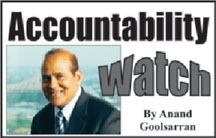Last week, we discussed the reason the President cited for proroguing Parliament as his belief that the Parliamentary Opposition wanted to disrupt Government’s business by forcing a debate on their no confidence motion. This was despite the fact that, in response to a letter from the Leader of the Alliance For Change, the President had stated that he welcomed the opportunity for the Administration to explain its actions to the people of Guyana. He also indicated that he was prepared to face the consequences of a vote of no confidence.
The President expressed the hope that his decision would allow for possible accommodations by both sides of the House to replace an atmosphere of confrontation that might have been precipitated by a debate of the motion. We felt that it would be difficult for this hope to translate into reality since all efforts over the last three years to accommodate the Opposition’s views on matters of national importance and to find compromise solutions have been met with stiff and complete rebuff from the Administration.
The President has had some four months since Parliament went into recess to dialogue with the Opposition to find a way to accommodate their concerns that gave rise to the motion. We can only speculate as to the reason(s) for not doing so. One popular belief was that the Administration was hoping that with each passing day there was a chance that at least one Opposition Member could be influenced to vote against the motion. The combined Opposition has, however, banded itself together on the issue. This, along with enormous pressures from all quarters, forced the President to convene Parliament only to prorogue it hours before it was due to meet.
The President has now invited the Opposition Leader for “post-prorogation” talks. So far, the latter has not formally responded, and it would come as no surprise if the Opposition Leader declines the invitation, given that all his previous engagements with the President have yielded no positive outcomes. The Opposition Leader has already publicly stated that the only dialogue that would take place is within the walls of the National Assembly.
 The President’s action has attracted overwhelming condemnation from all sectors of the Guyanese community as well as the international community. The latest such condemnation came from the UK High Commissioner who asserted that Parliament is the “central pillar of democracy” and that while the Constitution gives the President the power to prorogue Parliament, it also gives the right for majority of Members of Parliament to dissolve the Parliament and to have new elections. The High Commissioner cited the Charter of the Commonwealth and the central role Parliament plays in democracy.
The President’s action has attracted overwhelming condemnation from all sectors of the Guyanese community as well as the international community. The latest such condemnation came from the UK High Commissioner who asserted that Parliament is the “central pillar of democracy” and that while the Constitution gives the President the power to prorogue Parliament, it also gives the right for majority of Members of Parliament to dissolve the Parliament and to have new elections. The High Commissioner cited the Charter of the Commonwealth and the central role Parliament plays in democracy.
Audited public accounts
On 30 September 2014, the Auditor General presented to the Speaker of the Assembly his report on the public accounts for year 2013. This was at a time when the Assembly was in recess, and the Speaker was required to lay the report in the Assembly as soon as it reconvened. With the prorogation of Parliament, these audited accounts are still to be laid in the Assembly. As a result, the public is yet to be informed about the accountability of State resources made available to the Administration in 2013 for the execution of government programmes and activities.
Given this state of affairs, the Public Accounts Committee (PAC) would not be able to begin its examination of these accounts in the near future. Already, it is hard pressed to deliver on previous years’ accounts. In order to expedite its work, the PAC decided to undertake the combined examination of the 2010 and 2011 accounts. The last PAC report was in respect of 2009, and prior to the parliamentary recess, the PAC had not completed its work on the 2010-2011 accounts.
The importance of timely reporting on the country’s financial affairs, their reporting by the State Audit, and their examination by the PAC, cannot be over-emphasised. Any delay will have an adverse effect on the quality of governance since the value and impact of financial reporting diminishes with the passage of each day. Indeed, it would be fair to state that in the same way that democracy delayed is democracy denied, so is it with accountability.
Financial Paper 1/2014
On 19 June 2014, the Minister of Finance presented to the Assembly a paper requesting a supplementary estimate to cover excess expenditure totaling $4.554 billion incurred during the period 1 January to 16 June 2014. This sum represents part of the amount that the Assembly had declined to approve in the first place. The Opposition had appealed unsuccessfully to the Administration to separate contentious items in the proposed budget from those relating to essential services so that the latter could enjoy smooth passage. The Assembly therefore had no other alternative than to disapprove of some $37 billion in proposed expenditure.
The Opposition had suggested that the items relating to essential services be brought back to the House by way of a supplementary estimate with the assurance that the estimate would enjoy smooth passage. This suggestion was also brushed aside, and in defiance of the wishes of the Assembly and in violation of Article 217 of the Constitution, the Minister went ahead and authorized the withdrawal of this amount from the Treasury to restore parts of the original budget.
It was not until 10 July 2014 that Financial Paper 1/2014 (Statement of Excess) was placed on the Order Paper, with a note to the effect the paper would not be proceeded with, presumably because the Minister was granted leave of absence for this day. The Advisor on Governance had indicated that the paper would not be considered until 10 October when Parliament was scheduled to end its recess. With the prorogation of Parliament, the Assembly was unable to consider Financial Paper 1/2014 as well as other financial papers, which in all probability include further excess expenditure covering the second half of 2014 as well as advances from the Contingencies Fund. It will be recalled that the Assembly had declined to approve of some $700 million in advances made during the period 2012-2013.
The 2015 National Budget
The President has not specified how long the prorogation of Parliament will last. It can, however, not exceed six months, unless Parliament is recalled and prorogued again. This state of affairs has implications for the 2015 National Budget which is due for presentation in the Assembly by 31 March 2015. On the assumption that the prorogation will end to facilitate presentation of the Budget, the Minister is authorized to make withdrawals from the Consolidated Fund of up to four months to meet the cost of essential services. Such withdrawals are not to exceed one-twelfth of the previous year’s approved budget in each of the four months. No withdrawals can be made for capital works, except in cases where contractors have to be paid based on multi-year contracts entered into. The Administration will therefore be able to access funds without parliamentary approval up to 30 April 2015.
Without violating the Constitution and the Fiscal Management and Accountability Act, there will be no funds beyond 30 April 2015 unless the President dissolves Parliament. In this case, the Administration will have access to an additional three months of funding without parliamentary approval i.e. up to 31 July 2015 by which time fresh elections will have to be called.
Unlike the dissolution of Parliament, there is no provision for access to funds beyond the approved budget during the period of prorogation of Parliament.
Conclusion
The President’s decision to prorogue Parliament is unfortunate and has far-reaching consequences for the country finances. While the Administration has funds up to 31 December 2014 to execute its programmes and activities, it is necessary for the Assembly to meet to tidy up the spending for 2014, especially as regards consideration of supplementary estimates arising from the incurrence of excess expenditure as well as the clearing of advances from the Contingencies Fund. In addition, the Assembly needs to convene not later than 31 March 2015 to consider the 2015 National Budget and to give legitimacy to spending in the first four months of the new year.
With the rapid advances in information technology, it is unacceptable for financial statements to be prepared four months after the close of the financial year and for the results of their audit to be made available five months later. The Assembly should therefore consider the following revised timeframes for the accountability cycle:
Activity
Deadline
Approval of the national budget Before the beginning of the fiscal year but not later than 31 December of the previous year.
Preparation of financial statements Two months after the close of the fiscal year i.e. 28 February.
Completion of the audit Six months after the close of the fiscal year i.e. 30 June.
Completion of PAC examination Nine months after the close of the fiscal year i.e. 30 September.
If these timeframes are adhered to, the Assembly will have the benefit of the availability of audited accounts along with the results of the PAC’s examination of those accounts, during the consideration of the National Budget.




